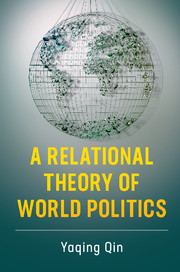Book contents
- A Relational Theory of World Politics
- A Relational Theory of World Politics
- Copyright page
- Contents
- Figures
- Tables
- Preface
- Acknowledgments
- Part I Culture and Social Theory
- 1 Social Theory and the Multicultural World
- 2 Theoretical Hard Core
- 3 Culture and Theoretical Innovation
- 4 Individualistic Rationality and Mainstream IR Theory
- Part II Relation and Relationality
- Part III Power, Cooperation, and Governance
- Bibliography
- Index
4 - Individualistic Rationality and Mainstream IR Theory
from Part I - Culture and Social Theory
Published online by Cambridge University Press: 03 April 2018
- A Relational Theory of World Politics
- A Relational Theory of World Politics
- Copyright page
- Contents
- Figures
- Tables
- Preface
- Acknowledgments
- Part I Culture and Social Theory
- 1 Social Theory and the Multicultural World
- 2 Theoretical Hard Core
- 3 Culture and Theoretical Innovation
- 4 Individualistic Rationality and Mainstream IR Theory
- Part II Relation and Relationality
- Part III Power, Cooperation, and Governance
- Bibliography
- Index
Summary
- Type
- Chapter
- Information
- A Relational Theory of World Politics , pp. 75 - 104Publisher: Cambridge University PressPrint publication year: 2018



